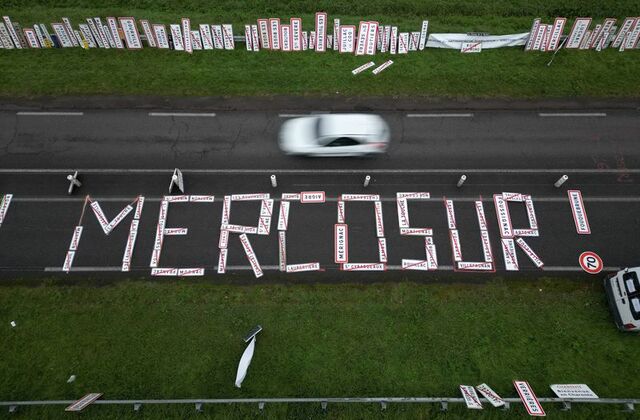The Irish Farmers’ Association has said the EU cannot provide consumers with the same standardised guarantees on food from the bloc’s countries, The Journal reports.
There is growing concern about a potential trade deal between the EU and members of South American trade bloc Mercosur over the impact it could have on Irish farmers and businesses.
European Commission President Ursula von der Leyen has said in recent days that a deal may not be far off. She landed in Uruguay last night and told reporters that an agreement was “in sight”.
The two sides have been negotiating a trade agreement since 1999 that aims to abolish import taxes between the EU and the countries of Argentina, Brazil, Paraguay and Uruguay. This would create a free trade zone with a population of 700 million.
Ireland, France, the Netherlands, Poland, Italy, Poland and Austria have voiced their doubts about the deal.
Thomas Duffy, a farmer from Co Cavan, wrote in The Journal this week that farmers are also concerned about the lower standards and traceability of Brazilian beef production, particularly the use of hormones and deforestation.
It is currently unclear, but highly unlikely, that the trade agreement will require farmers in participating countries to adhere to European standards and a traceability model. This, despite the fact that produce from these countries is generally of good quality, is causing serious discontent amongst food producers in Ireland.
Speaking on RTÉ Radio One’s Irish Morning programme this morning, Declan Hanrahan, chairman of the Irish Farmers’ Association’s livestock committee, said products would not meet the standards set by the European Commission. He also added:
“We (in Ireland) work under high standards, high traceability, from farm to fork. It comes at an additional cost to our production base. We have a family-farm model across Europe and across Ireland, which is the envy of a lot of world production.”
Many farmers believe that once a large free trade zone is established, South American producers could lose out to European traders because margins may be smaller in the Latin market. Hanrahan said:
“This deal is an insult to Europe, Irish farmers, European farmers and mostly European consumers.”
He claims the European Commission, which is about to agree to the deal, will not be able to guarantee some of the produce that will reach the European market.
Farmers also call the agreement hypocritical in the context of the EU’s main climate policy, the Green Deal. They argue that countries such as Brazil are being rewarded despite record levels of deforestation in the Amazon in 2022.
Yesterday, French President Emmanuel Macron called von der Leyen to voice his doubts about the deal. He called the deal “unacceptable.”
Independent Ireland MEP Ciaran Mullooly, non-party MEP for Luke “Ming” Flanagan and Sinn Féin MEP Lynn Boylan also spoke out against the deal. Fine Gael MP Sean Kelly told RTÉ News this morning that he will meet von der Leyen next week and raise the concerns of Irish farmers.
Countries such as Spain and Germany have welcomed the deal as they believe it will favour the sale and distribution of wine and cars respectively. The European Wine Industries Committee welcomes the deal.
Any agreement must first be ratified by a majority of members of the European Council, which includes Taoiseach and other European leaders, before getting the green light from MEPs in the European Parliament.
This week, the European Parliament’s trade committee approved a motion welcoming any potential deal that could emerge from von der Leyen’s visit to Uruguay.
